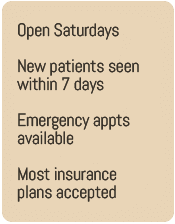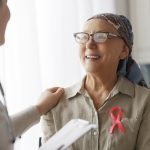What to Expect During Your First Colonoscopy
If you are nearing the age of 45, it’s time to think about getting your first colonoscopy. While scheduling a colonoscopy may not top your list of birthday preparations, having one could ensure you celebrate many more birthdays in years to come.
Colorectal cancer is the third leading cause of cancer deaths in the United States. It has been steadily increasing among younger Americans. Fortunately, it is also one of the most preventable forms of cancer – largely due to colon screenings, or colonoscopies.
Normally, colon cancer begins from small, non-cancerous cells called polyps that develop into cancer over time. Polyps often do not produce symptoms, so regular colonoscopies are important to detect and remove them. Countries that encourage early colon cancer screenings have seen major declines in colorectal cancer incidence and deaths.
Now that we’ve convinced you to add a colonoscopy to your to-do list, let’s review what you should expect during your first colonoscopy. This article discusses what a colonoscopy is, when to schedule your first colon screening, what to expect from the procedure and how often you need colonoscopies.
What is a colonoscopy?
A colonoscopy is a medical exam of the entire length of the colon, or large intestine, and the rectum.
During a colonoscopy, a doctor inserts a long, flexible tube with a light and video camera on the end into the anus, rectum and through the length of the colon. This tube, called a colonoscope, allows doctors to view the inside of the colon. The doctor can use this tool to remove or take a sample of suspicious-looking growths or polyps.
Colonoscopies are one of the most powerful ways to prevent colon cancer. However, they can be used for other reasons.
Your primary care physician may recommend that you have a colonoscopy if you are experiencing abdominal pain, rectal bleeding, ongoing diarrhea or other intestinal issues. Colonoscopies can also treat intestinal issues or remove objects from the colon.
When should you get your first colonoscopy?
Colorectal cancer experts recommend adults with an average risk of colorectal cancer begin screenings at age 45.
For those with a family history of colorectal cancer, inflammatory bowel syndrome (IBS) or hereditary cancer syndrome, you qualify as high risk. High-risk individuals should be screened before the age of 45.
Other risk factors for colorectal cancer include:
- Obesity or being overweight
- Type 2 diabetes
- Smoking
- Moderate to heavy alcohol use
- Age – people over 50 years of age
- Race – African Americans have the highest rate of developing colorectal cancer
Speak with your primary care doctor about when you should be screened for colorectal cancer based on your family and personal medical history.
What should you expect during your colonoscopy?
Before a colonoscopy, your physician will ask you to clean out your colon. Any leftover residue can make it difficult to accurately see all of your colon and any abnormal polyps.
Read instructions a week to a few days before your procedure in case you need to shop for specific groceries or laxatives.
Bowel prep
- Special diet – Your doctor will give you instructions to prepare for your colonoscopy. This may include a colonoscopy prep diet to avoid specific foods, medicines and drinks before the procedure.
- Typically, you will want to stay on a low-residue diet for a few days prior to your colonoscopy. The Colorectal Cancer Alliance offers a shopping list for your colonoscopy prep here. The day before your colonoscopy, you will be limited to clear liquids.
- Laxative – Your doctor will likely prescribe a laxative and recommend you take a large amount of it the night before the procedure. This often causes patients to spend a lot of time in the bathroom.
- Medication adjustments – Remind your doctor about your prescription medications a week prior to your procedure. They will provide directions on how to take your medications, adjust the dosage or temporarily stop them.
During your colon screening
Before the test, you will be given a sedative or anesthesia to make you relaxed and more comfortable. You will likely wear a gown, but nothing else.
During the test, you will lie on your side with your knees pulled toward your chest. The doctor will check you, then insert the lubricated colonoscope into your rectum. It will be passed through the entire length of your colon.
The colonoscope has a video camera, light and tube, which allow the doctor to put air into the colon to see the lining. As the colonoscope is moved or air goes in, you may feel an urge to have a bowel movement.
As the colonoscope is removed, your doctor will carefully review the camera from inside your colon. If a polyp or abnormal growth is found, your doctor may review it or take a tissue sample and send it to the lab for testing.
How long does a colonoscopy take?
You will likely be at the outpatient facility for two to three hours. The colonoscopy procedure itself normally takes about 30 to 60 minutes.
After your colonoscopy
Following the procedure, you will be monitored for about an hour while you recover from the sedative.
Arrange a driver to take you home and get you into your house safely. It can take up to a day for the sedative’s effects to wear off completely. Do not drive, return to work or make any important decisions for the rest of the day.
You may feel discomfort from the gas that was pumped into your colon but should experience relief as it passes.
Your doctor will review the exam findings once you have recovered. If polyps or abnormalities are found during your colonoscopy, your doctor will share the lab results with you. Most polyps are not cancerous, but some may be precancerous.
If your polyps are precancerous or cancerous, your doctor will review recommendations and next steps for monitoring or treatment.
If you are diagnosed with colorectal cancer, Personalized Hematology-Oncology is at the forefront of genetic testing and personalized, targeted cancer treatments to help patients. We combine our scientific expertise with compassionate care to deliver a custom-tailored approach to treating patients with colorectal cancer.
How often do you need to get a colonoscopy?
How often you need to have a colonoscopy will depend on the results of your exam and your family and personal medical history. Generally, your doctor will recommend another colonoscopy within seven to 10 years.
If you have multiple and/or large polyps, stool in the colon preventing a complete exam, abnormal polyps or cancerous polyps, the doctor may recommend another exam sooner than seven years.
Do I really need to have a colonoscopy, or can I use a different type of test?
Colonoscopies are the best option to prevent colorectal cancer. Advertised options for fecal tests, like Cologard, may seem simpler, but they are unable to detect most high-risk precancers and provide no cancer prevention. They are also not recommended for high-risk patients.
There are a variety of colon cancer screening tests, including colonoscopies, flexible sigmoidoscopies, double-contrast barium enemas (DCBE), CT colonographies (virtual colonoscopy), and blood and fecal tests.
Speak with your primary care doctor to find the right test for you.
Colorectal cancer prevention and colonoscopies in Raleigh
Though colorectal cancer is the third leading cause of cancer deaths, it is often preventable through colonoscopies beginning at age 45. Our team takes a proactive approach to maintaining your overall health and wellness. At Personalized Hematology-Oncology, our primary care physicians can talk with you about colon cancer prevention and scheduling your first colonoscopy. Contact our office today to discuss colorectal cancer screenings.





